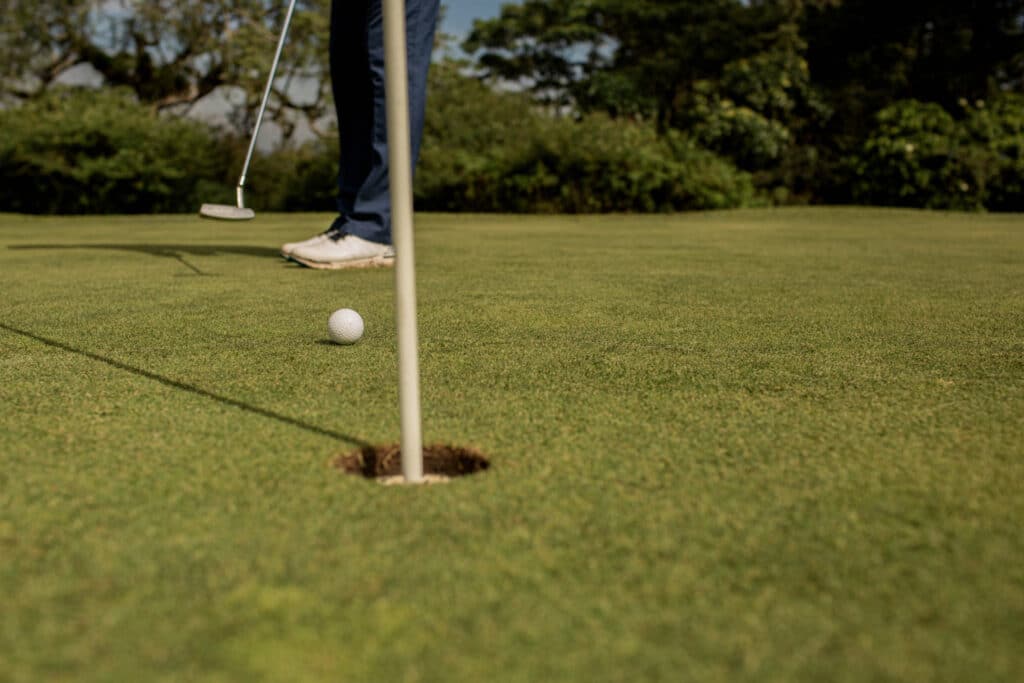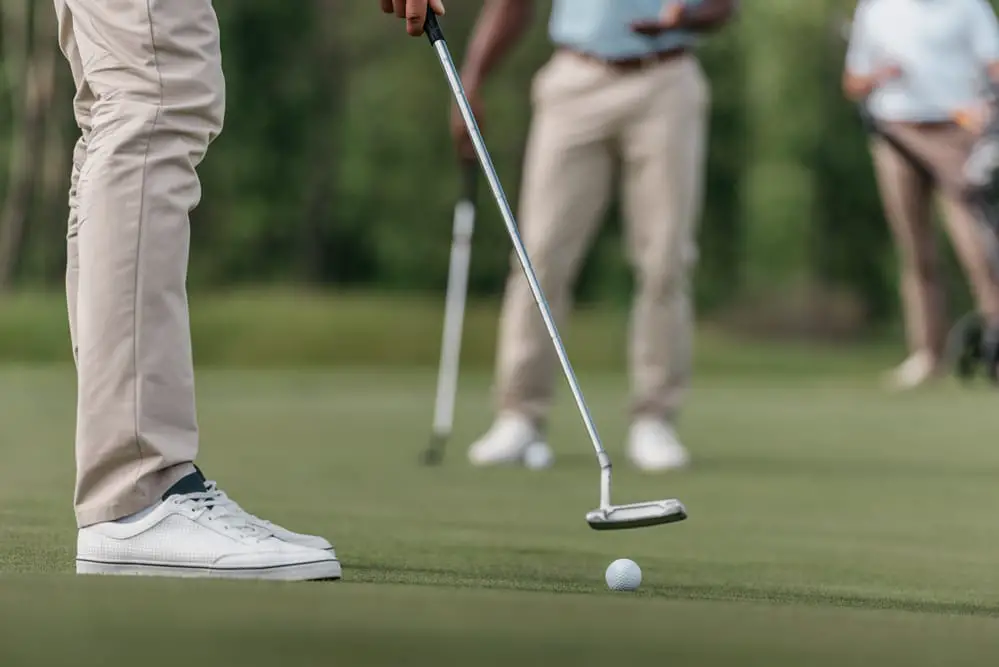Last Updated on November 20, 2023
Golf is a sport that requires physical and mental strength. To become an excellent golfer, one must be able to stay focused and keep their emotions in check while on the course.
This article will explore how golfers can better utilise their mental skills to play better golf. It will provide advice on how golfers should approach different situations they may encounter during a round of golf, such as dealing with bad shots or bouncing back after hitting poor tee shots. Furthermore, it will discuss strategies for staying positive throughout the game and maintaining focus when faced with distractions. So, let’s discuss how to play better golf mentally.
Strategies for Concentration and Focus
To play better golf mentally, concentration strategies and focus techniques are essential. Mental preparation for a round of golf should involve positive thinking about the game and staying motivated throughout the course. Focusing on the task at hand is important to stay consistent with shots and avoid distractions from outside influences. Visualisation can be an effective tool prior to each shot so that players become more familiar with the intended path of their ball.
Additionally, taking deep breaths before attempting a putt or drive can help maintain composure when under pressure. Practising regularly will create muscle memory which allows players to trust their swing without overthinking it during gameplay. By utilising these methods, one’s mental state can remain strong while playing any course regardless of difficulty level.
Visualisation Techniques
Visualisation techniques are an effective way to improve a golfer’s mental game. This technique involves mentally imagining scenarios on the golf course and practising what the desired outcome should be. A great way for golfers to use visualisation is by creating mental images of successful shots, being aware of their body movements involved in each shot, and then visualising how those images will help them achieve better performance.
To maximise the effectiveness of visualisation techniques, it is important that a golfer follows these four steps:
- Utilise mental golf imagery while calming the mind during practise rounds or when playing courses.
- Employ a global mental approach throughout every round – before, during, and after each shot.
- Incorporate positive self-talk as part of any pre-shot routine or strategy instruction given to oneself.
- Develop mindful golfing habits through meditation and relaxation exercises geared toward improving focus and concentration levels on the course.
These strategies can help players become more confident in their abilities on and off the golf course so they can enjoy their time out there even more than ever before. With consistent practise using visualisation techniques, golfers can increase their overall skillset and perform at higher levels during play.
Pre-Shot Routine
Golf is a game that requires mental discipline to excel. Establishing a pre-shot routine can help golfers gain more control over their mental preparation and practise for the game. This type of routine helps to give players better focus, improved concentration and an overall positive outlook on the round ahead.
| Mental Preparation | Mental Discipline | Mental Relaxation |
|---|---|---|
| Visualise shot | Take deep breaths | Positive affirmations |
| Practise swings | Maintain posture | Listen to music |
| Review aim | Stay calm | Talk with playing partner |
| Read greens | Focus on target line | improved concentration |
Pre-shot routines are essential in helping golfers stay mentally prepared throughout each hole and each round played. During the routine, it is important for the golfer to take time for visualisation, practise swings, review of the target line, reading of the green and other helpful activities. Additionally, taking deep breaths and maintaining good posture can help bring about the mental discipline needed during play. To relax before hitting shots, listening to music or talking with one’s playing partners can also be beneficial strategies.
Utilising these tips while creating a personalised pre-shot routine will go a long way in improving both course management skills as well as performance out on the links.
Handling Pressure

Golf involves a great deal of mental pressure, as players must make decisions in the face of ever-changing conditions. Properly managing this pressure is essential for performing well on the course. One key component to handling anxiety and performance anxiety is understanding that it is natural; everyone experiences nerves when competing or playing under challenging circumstances. Therefore, developing methods to overcome these emotions can be beneficial over time.
Mental resilience is important for golfers who want to succeed in high-pressure situations. Strategies such as deep breathing, positive self-talk, visualisation techniques, and focusing on one shot at a time are all useful ways to manage pressure on the golf course. To ensure success in tournaments or competitive rounds, players should prioritise regular practise sessions devoted entirely to mastering these skills so that their body becomes familiar with responding positively during moments of stress.
Mastering the Mental Game in Practise Rounds
Having developed a winning mindset through visualisation, golfers can now focus on mastering the mental game in practise rounds. Practise rounds are essential for honing skills and techniques to prepare for tournament play. It is also an opportunity to work on managing emotions, staying focused, and improving decision-making abilities. These psychological elements of the game should be practised regularly during practise sessions to ensure they become second nature when playing competitively.
To master the mental game during practise rounds, it is important that golfers stay mentally engaged throughout each shot. This means being aware of one’s thoughts and feelings while swinging and using positive self-talk to remain calm and confident. Being present at the moment will help golfers stay focused on their technique without worrying about what might happen next or the results from previous shots. Additionally, taking time between shots to visualise success may enhance performance by creating a mental picture of how each swing should look and feel like before attempting it. By doing so, players make better decisions which leads to improved performance overall.
Frequently Asked Questions
What Are the Biggest Mental Challenges in Golf?
Golf is a highly mental sport, with players required to have strong psychological skills in order to perform well. The biggest mental challenges related to golf include 1) managing golf confidence, 2) maintaining concentration and focus through the entire round, and 3) dealing with pressure during critical moments on the course.
Psychology plays an important role in helping golfers stay motivated and improve their game. Developing strategies to manage one’s psychology can be essential for playing better golf mentally. For example, building self-confidence helps golfers believe they are capable of performing certain shots or achieving particular goals.
Conclusion
Golf can be an incredibly rewarding and fulfilling game. The key to learning how to play better golf mentally is mastering its mental side of the game. Practising regularly, staying motivated, controlling emotions, and using appropriate equipment are all essential elements in improving one’s golfing ability. With a little bit of dedication and focus, any golfer has the opportunity to reach their goals on the course.
It is important for individuals to remember that the journey towards improvement often requires patience and resilience. Golfers must continuously push themselves both physically and mentally in order to become better players. Staying focused on short-term objectives while maintaining a long-term perspective can help keep the momentum going even when faced with adversity or frustration. Additionally, it is beneficial for players to develop strategies for managing stress and avoiding burnout.


